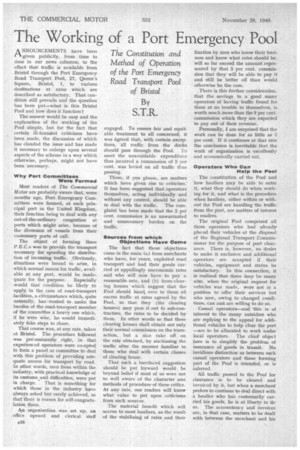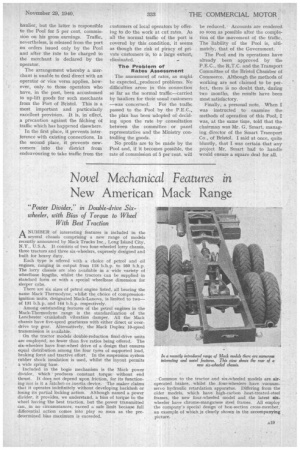The Working of a Port Emergency Pool
Page 20

Page 21

If you've noticed an error in this article please click here to report it so we can fix it.
The Constitution and Method of Operation of the Port Emergency Road Transport Pool
of Bristol
By S.T.R.
A NNOUNCEMENTS have been "given publicity, from time to time in our news columns, to the effect that traffic is available from Bristol through the Port Emergency Road Transport Pool, 27, Queen's Square, Bristol, 1, to various destinations at rates which are described as satisfactory. That condition still prevails and the question has been put—what is this Bristol Pool and how does it function?
The answer would be easy and the explanation of the working of the Pool simple, but for the fact that certain ill-founded criticisms have been made, the discussion of which has clouded the issueand has made it necessary to enlarge upon several aspects of the scheme in a way which otherwise, perhaps, might not have been necessary.
Why Port Committees Were Formed
Most readers of The Commercial Motor are probably aware that, some months ago, Port Emergency Committees were formed, at each principal port in the United Kingdom, their function being to deal with any out-of-the-ordinary congestion at • ports which might arise, because of the diversion of vessels from their customary ports of call.
The object of forming these P.E.C.s was to provide the transport necessary for speeding the distribution of incoming traffic. ,Obviously, Situations were bound to arise, in which normal means for traffic, available at any port, would be inade
quate for the purpose. Especially would that condition be likely to apply, in the case of road-transport facilities, a circumstance which, quite naturally, has 'tended to make the burden of the road-transport member.. of the committee a heavy one which, if he were wise, he would immediately take, steps to share.
That course was, at any rate, taken at Bristol. The procedure followed was pre-eminently right, in that experienced operators were co-opted to form a panel or committee to deal with this problem of providing adequate means for transport by road. In other words, men from within the industry, with practical knowledge of its customs and difficulties, were put in charge. That is something for which those in the industry have always asked but rarely achieved, so that there is reason for self-congratulation there.
An organization was .set up, an office opened and clerical staff engaged. To ensure fair and equitable treatment to all concerned, it was agreed that, with certain exceptions, all traffic from the docks should pass through the Pool. To meet the unavoidable expenditate thus incurred a commission of 5 per cent, was levied on all traffic thus passing.
These, if you please, are matters which have given rise to criticism.' It has been suggested that operators themselves, acting individually and without any control, should be able to deal with the traffic. The complaint has been made that the 5 per cent, commission is an unwarranted and unnecessary burden on the traffic.
Sources from which Objections Have Come
The fact that these objections come in the main (a) from merchants who have, for years, exploited road transport and had their goods carried at appallingly uneconomic rates and who will now have to pay a reasonable rate, and (b) from, clearing houses which suggest that the Pool should hand, over to them all excess traffic at rates agreed by the Pool, so that they (the clearing houses) may pass it out to sub-contractors, the rates to be decided by them. In other words so that these clearing houses shall obtain not only their normal commission on the transaction, but a nice rake off on the rate obtained, by auctioning the traffic after the manner familiar to those who deal with certain classes of clearing house.
That such a barefaced suggestion should be put forward would be beyond belief if most of us were not so well aware of the character anct methods of procedure of these critics, At any rate, our readers will know what value to put, upon criticisms from such sources.
The material benefit which will accrue to most hauliers, as the result of the stabilizing of rates and their fixation by men who know their business and know what rates should be, will so far exceed the amount represented by that 5 per cent. commission that they. will be able to pay it and still be better off than would otherwise be the case.
There is this further consideration, that the savings to a good many operators of having traffic found for them at no trouble to themselves, is worth much more than the 5 per cent. commission which they are expected to pay out of their revenue.
Personally, I am surprised that the work can be done for as little as 5 per cent. If it continues at that rate the conclusion is inevitable that the work of organization is excellently and economically carried out.
Operators Who Can Help the Pool
The constitution of the Pool and how hauliers may be able to enter it, what they should do when working for it, and what is the procedure when hauliers, either within or without the Pool are handling the traffic from the port, are matters of interest to readers.
The original Pool comprised all those operators who had already placed their vehicles at the disposal of the Regional Transport .Commissioner for the purpose of port clearance. There is, however, no desire to make it exclusive and additional operators are accepted if their vehicles, equipment and status be satisfactory. In this connection, it is realized that there may be many who, when the original request for vehicles was made, were not in a position to offer their services but who now, owing to changed conditions, can and are willing to do so.
Casual operators—and 'this is of interest to the many outsiders who are replying to the appeal for additional vehicles to help clear the port —are to be allocated to work under local operators. The chief object here is to simplify the problem of insurance of goods in transit. No invidious distinction as between such casual operators and those forming part of the Pool is intended, or is inferred.
All traffic passed to the Pool for clearance is to be cleared and invoiced by it, but when a merchant prefers to continue to deal direct with a haulier who has customarily carried his goods, he is at liberty to do so. The accountancy and invoices are, in that case, matters to be dealt with between the merchant and his haulier, but the latter is responsible to the Pool for 5 per cent, commission on his gross earnings. Traffic, nevertheless, is released from the port on orders issued only by the Pool and after the rate to be charged to the merchant is declared by the operator.
The arrangement whereby a merchant is unable to deal direct with an operator or vice versa applies, however, only to those operators who have, in the past, been accustomed to up-lift goods for such merchants from the Port of Bristol. This is a most important and particularly excellent provision. It is, in effect, a precaution against the filching of traffic which has happened elsewhere.
In the first place, it prevents interference with existinq connections. In the second place, it prevents newcomers into the district from endeavouring to take traffic from the customers of local operators by offering to do the work at cut rates. As all the normal traffic of the port is covered by this condition, it seems as though the risk of piracy of private customers is, to a large extent, eliminated.
The Problem of Rates Assessment
The assessment of rates, as might be expected, produced problems. No difficulties arose in this connection so far as the normal traffic—carried by hauliers for their usual customers —was concerned. For the traffic passed to the Pool by the P.E.C., the plan has been adopted of deciding upon the rate by consultation between the committee or panel representative and the Ministry controlling the goods.
No profits are to be made by the Pool and, if it becomes possible, the rate of commission of 5 per cent. will
be reduced.Accounts are rendered so soon as possible after the completion of the movement of the traffic. The liability of the Pool is, ultimately, that of the Government.
The Pool and its operations have already been approved by the P.E.C., the R.T.C. and the Transport Committee of the Bristol Chamber of Commerce. Although the methods of working are not claimed to be perfect, there i no doubt that, during two months, the results have been most satisfactory.
Finally, a personal note. When I was instructed to examine the methods of operation of this Pool, I was, at the same time, told that the chairman was Mr. G. Smart, managing. director of the Smart Transport Co., of Bristol. I said at once, quite bluntly, that I was certain that any project Mr. Smart had to handle would ensure a square deal for all.




















































